A design competition initiative of USAID Transform WASH
Published on: 01/03/2021
The simple act of properly washing hands with soap is one of the most cost-effective public health interventions. This is particularly true of the fight against transmission of Covid-19. Yet the most recent national data show that only eight percent of Ethiopian households have access to a basic handwashing facility with 40 percent lacking any facility at all (JMP 2017).
Following the outbreak of the coronavirus pandemic, public awareness campaigns have resulted in growing demand for household and institutional handwashing stations. A rapid market assessment conducted by USAID Transform WASH (T/WASH) found that few reasonably priced products existed for customers to buy handwashing stations -- particularly safer, no-touch options -- within a price range that they could afford.
To address this market failure and get affordable products into the hands of as many customers as possible, we set out to spark Ethiopian innovation. We launched a design competition for mass manufacturable no-touch handwashing products that could be made available at scale at affordable prices for households in both rural and urban areas. T/WASH partnered with the Federal Ministry of Health to organize the national design competition, which aimed to find the most practical, no-touch industrial designs for handwashing stations to serve both household and institutional markets.
All in all, we received 59 entries with design concepts and specifications that fulfilled our basic criteria of affordability and scalability. Our team pulled together a diverse team of professionals to short-list candidates, and they dedicated two full days to reviewing the proposals and financial statements. The team separated their evaluations into institutional and household technology applications. After two rounds of screening, eight candidates were shortlisted.
In November 2020, Transform WASH organized a pitch session in Addis Ababa for the shortlisted candidates to present their designs to a panel of evaluators, media outlets, and other stakeholders. Two finalists were selected each for household and institutional handwashing station designs. Here is a brief profile of the competition winners:
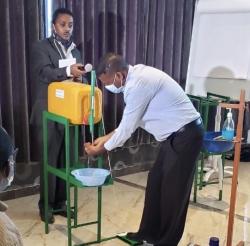
Demonstration of Mulat's foot-operated tap attached to a jerrycan
Alazar designed an ultrasonic-sensor-based no-touch handwashing design. He developed the concept after observing his colleagues’ fear of turning on the tap manually at their handwashing station at the Ethiopian Electric Power Corporation following the Covid-19 outbreak. The sensor can be installed on any existing tap with a back-up battery that functions for 10 minutes following a power disruption. Alazar’s sensors cost 2,270 birr (54.99 USD) for the water controller and 1,200 birr (29.07 USD) for the soap dispenser.
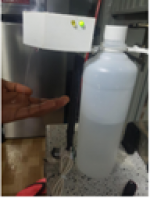
Alazar's sensor-based handwashing device
Henok Addisu and two of his friends designed a station using an infrared-based obstacle detector. One of the sensors guides users to scrub their hands for 20 seconds after the water and soap begin dispensing. This design is also battery-powered and can work for up to 60 days without being recharged. The sensors can be easily fixed to an existing, manual handwashing station within households or institutions with two different options: the GENUINE BETA, a sensor for general households, will cost an estimated 680 birr, the PREMIUM will sell for 800 birr (19.38 USD), and the GENUINE XL price is around 1,900 birr (46.02 USD).
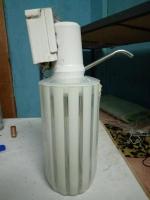
Henok and friends' handwashing station with infrared detector
Muluken is a computer science graduate who designed a sensor-based handwashing facility which can operate using a chargeable battery. The facility also features its own water storage. According to Muluken, the product is accessible to people with disabilities, has key ergonomic aspects to the design, and other aesthetic values. It also discourages users from drinking water or washing their faces at the station as this increases the likelihood of contamination. The design is suitable for both institutions and households at an estimated cost of 2,990 birr (72.43 USD).
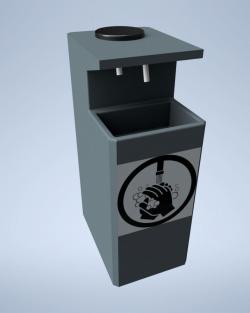
Sensor-based handwashing device designed by Muluken Tadese and friends
The design competition demonstrated that local innovation is not only possible, but it boosted the creative confidence of the contestants. Beyond the competition itself, the ultimate aim was not simply to award prizes to the best designs but to get new products into the marketplace at scale as soon as possible. ‘It is not the capacity to innovate that is lacking in Ethiopia but the opportunity to network and link innovators with the industrial sector, which has the capacity to bring that innovation to scale,’ Alazar said. To create such an opportunity, T/WASH invited the top six designers to attend a workshop at the TVET vocational college in Bahirdar to refine their designs and prototypes with the assistance of an industrial design expert. The design refinements were meant to produce the kinds of plans and models that are required as specifications for manufacturing, which can attract an enterprise to mass produce the products.
“Such a platform should be created on a larger scale in the country, based on the T/WASH experience. It provides an opportunity for young entrepreneurs to show their creativity and improve their products based on learning and experience from seasoned experts and private sector actors,” said Ayatam Simeneh, T/WASH partnerships and communications advisor at PSI.The design contest offered a learning opportunity and inspiration. According to Abraham Ezekiel, who was not one of the selected finalists, what mattered most was not whether their products were selected, but rather ‘the opportunity to present the prototype to judges and the learning from their comments and from fellow contestants.”
With contributions from Ephraim Mebrate, Tsegaye Yeshiwas, Ayatam Simeneh, and Dagim Demirew
USAID Transform WASH is a USAID-funded activity implemented by PSI in collaboration with SNV, Plan International, and IRC WASH. The consortium is working closely with government agencies, including the Ministry of Health, the Ministry of Water, Irrigation and Electricity, the One WASH National Program, and regional and sub-regional governments.
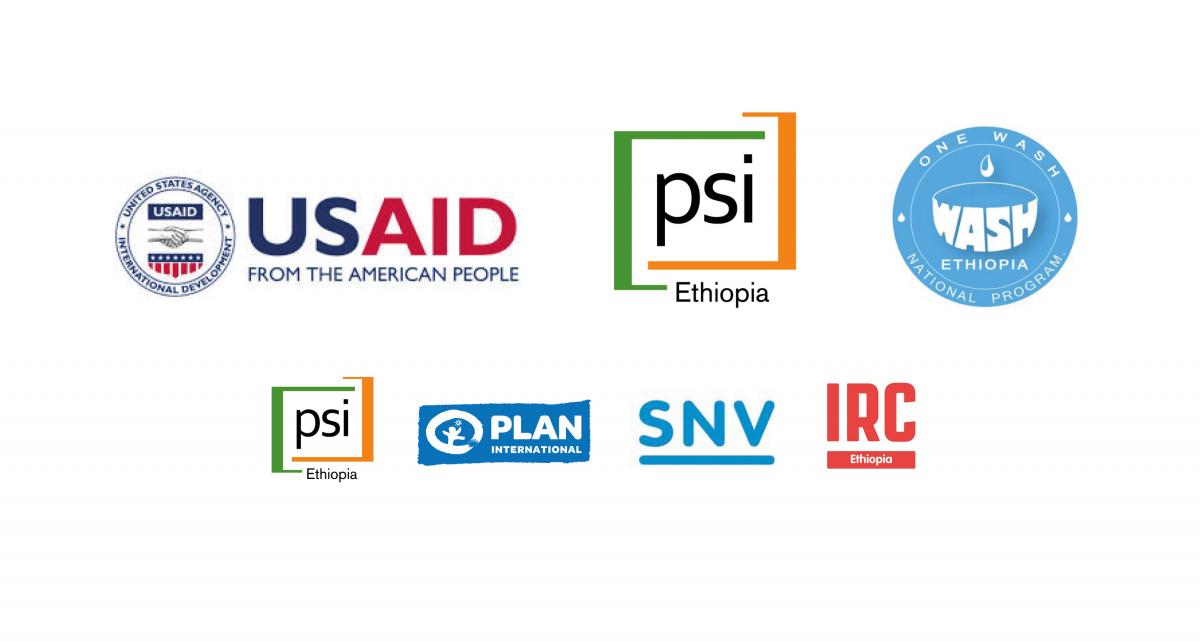
At IRC we have strong opinions and we value honest and frank discussion, so you won't be surprised to hear that not all the opinions on this site represent our official policy.